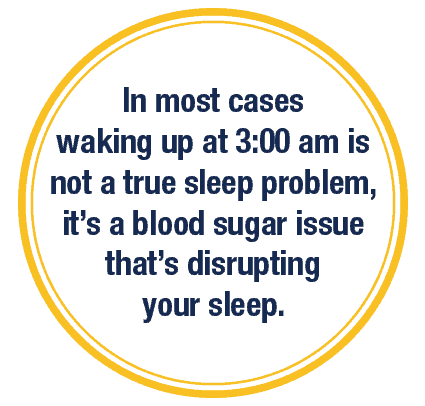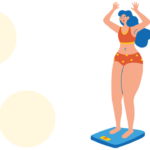
Is Your Blood Sugar Keeping You Up at Night?
It’s that 3:00 am wake-up call that too many of us know so well. As you’re lying there wishing you could get back to sleep, maybe you begin to wonder why it’s so often like this – great sleep, until 3:00 am. Well, your muffin top could be a factor, along with the muffins and other blood-sugar spiking carbohydrates that created it!
SLEEP DISTURBANCE
I have been lecturing on sleep disturbances for a few years now, and waking up in the middle of the night is definitely one of the top reasons people come to my lectures. If the exhausted crowds at my talks are anything to go by, the typical insomnia stats seem to severely underrepresent this problem.
There are many types of sleep disturbances, such as difficulty getting to sleep, waking up every couple of hours or awake too early. But waking up at or around 3:00 am is a particularly common type of sleep problem that frequently has an unexpected crony: belly fat. Appreciating the connection between these two may help you get two outs with one pitch.
For years researchers at the Vancouver-based Canadian Centre for Functional Medicine heard the same comment from participants in their weight loss trials: “I’m sleeping better”.
Since these were weight loss studies and not sleep studies, researchers didn’t pay too much attention to this added benefit at first. Then they began to employ a technology that monitored participants’ blood sugar levels continuously (every few seconds) for periods of 24 hours and longer.

This revealed trends in blood sugar changes that they had never seen before, and it led to an astonishing realization: many people waking up at 3:00 am were experiencing a sudden drop in blood sugar just prior to waking up – a phenomenon known as nocturnal hypoglycaemia.
BLOOD SUGAR CRASH
Here’s what happens. When people gain weight, especially abdominal fat, blood sugar levels gradually begin to fluctuate more in response to eating throughout the day Although you’ve likely heard that having high blood sugar is a bad thing (and it is), in fact, it’s rapidly falling blood sugar that will produce noticeable symptoms.
When blood sugar plummets, the body tries to stabilize the situation in a few ways, in addition to triggering hunger signals. In particular, when blood sugar is crashing our major organs of stress response, the adrenal glands, will produce adrenalin. This is an emergency blood sugar raising tactic. During the day this adrenalin surge can be felt as the symptoms of hypoglycemia: anxiety, shakiness, sweating, feeling irritable, or “hangry”. At night, when blood sugar drops rapidly enough, an adrenalin surge during sleep will wake you up. And due to some particular quirks in our physiology, this tends to happen at around 3:00 am.
HOW ABDOMINAL FAT IS DIFFERENT
No one is crazy about having excess fat anywhere on our bodies, but fat cells in our arms and legs are usually just inert insulation. Abdominal fat cells, on the other hand, once they reach a critical mass, actually change their function and begin to act like endocrine glands, meaning they begin to respond to hormonal input, and even secrete hormones in return. Functioning as endocrine glands, these cells are not much affected by diet and exercise, which is why abdominal fat is so darn difficult to shed.
Once abdominal fat has morphed into an endocrine gland, the whole weight-loss matter of calories-in versus calories-out equation doesn’t apply anymore. What now governs these fat cells is hormonal input. The hormones insulin and cortisol send powerful messages to cause those belly fat cells to continue growing. Since most diets don’t address hormone levels, they are ultimately ineffective at reducing weight where we would mostly like to lose it – in our belly.
By the way, when I say abdominal fat I’m not talking about that small roll of a few pounds that can appear seemingly overnight sometime around menopause. In the absence of other symptoms like cravings and insomnia, that little bit of pudge is generally not harmful and in fact can be very helpful in buffering changes in estrogen levels.
BLOOD SUGAR TIPS
What if you wake up in the middle of the night, but you’re not overweight, or maybe you’re even on the thin side? Some (usually thin) individuals report that they need to eat every three hours during the day or they experience hypoglycaemic symptoms, they might even carry snacks or candies for “emergencies”. If this describes you, then you are also on the blood sugar roller coaster and will benefit from the following tips.
STABILIZING BLOOD SUGAR
Ok, so now you know why you wake up in the middle of the night, what are you going to do about it? First, stabilize your blood sugar.
Avoid High-Glycemic Index Foods
that will cause your blood sugar to spike (sugar, white flour, pop, juice, sugary drinks). Choose whole, unprocessed, foods without added sugars.
Eat Regular Meals and Don’t Skip Breakfast
In fact, what you eat for breakfast sets the tone for your blood sugar for the rest of the day, so make it a good one. Examples of breakfasts that qualify include a whole egg omelette packed with veggies, full-fat Greek yogurt sprinkled with nuts and seeds, and a protein smoothie with avocado and chia. Your breakfast should be keeping you feeling full and satisfied for hours.
Eat Protein Snacks some fat, and lots of soluble fibre (see below) with each meal. These three elements will keep your sugar stable.
Take Chromium
200 mcg daily to help your body utilize insulin better and reduce sugar cravings.
SOLUBLE FIBRE
When it comes to dietary fibre, we often think of bran. Bran ls insoluble fibre, and while that improves regularly, it won’t help stabilize your blood sugar. That job belongs to soluble fibre, the invisible, complex polysaccharide found in whole, unprocessed fruit, veggies, legumes, nuts, and seeds. Soluble fibre will absorb water to form a natural fibre gel in the stomach. The gel will combine with sugar to release it more slowly into the blood stream, buffering the impact on blood sugar levels.
In most cases, being awake at 3:00 am is not a true sleep problem, it’s a blood sugar issue that’s disrupting your sleep. Understanding this connection should help you get a better night’s sleep… and maybe even help you wake up a little thinner.
SOLUBLE FIBRE
When it comes to dietary fibre, we often think of bran. Bran ls insoluble fibre, and while that improves regularly, it won’t help stabilize your blood sugar. That job belongs to soluble fibre, the invisible, complex polysaccharide found in whole, unprocessed fruit, veggies, legumes, nuts, and seeds. Soluble fibre will absorb water to form a natural fibre gel in the stomach. The gel will combine with sugar to release it more slowly into the blood stream, buffering the impact on blood sugar levels.
In most cases, being awake at 3:00 am is not a true sleep problem, it’s a blood sugar issue that’s disrupting your sleep. Understanding this connection should help you get a better night’s sleep… and maybe even help you wake up a little thinner.














